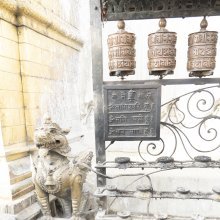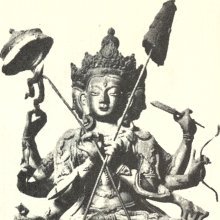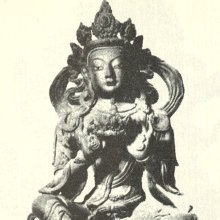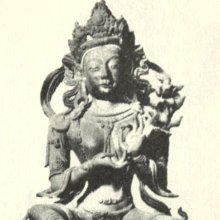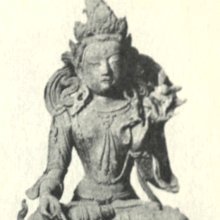Mu, Mū: 10 definitions
Introduction:
Mu means something in Hinduism, Sanskrit, Tamil. If you want to know the exact meaning, history, etymology or English translation of this term then check out the descriptions on this page. Add your comment or reference to a book if you want to contribute to this summary article.
Images (photo gallery)
(+165 more images available)
In Hinduism
Ganitashastra (Mathematics and Algebra)
Source: archive.org: Hindu MathematicsMū (मू) refers to the “square-root” as it represents the abbreviation of mūla, according to the principles of Bījagaṇita (“algebra” or ‘science of calculation’), according to Gaṇita-śāstra, ancient Indian mathematics and astronomy.—The symbols for powers and roots are abbreviations of Sanskrit words of those imports and are placed after the number affected. [...] In the Bakhshali treatise the square-root of a quantity is indicated by writing after it mū, which is an abbreviation for mūla (root). In other treatises the symbol of the square-root is ka (from karaṇī, root or surd) which is usually placed before, the quantity affected.

Ganitashastra (शिल्पशास्त्र, gaṇitaśāstra) refers to the ancient Indian science of mathematics, algebra, number theory, arithmetic, etc. Closely allied with astronomy, both were commonly taught and studied in universities, even since the 1st millennium BCE. Ganita-shastra also includes ritualistic math-books such as the Shulba-sutras.
Languages of India and abroad
Sanskrit dictionary
Source: DDSA: The practical Sanskrit-English dictionaryMu (मु).—
1) An epithet of Śiva.
2) Bondage, confinement.
3) Final emancipation.
4) A funeral pile.
5) A reddish-brown or tawny colour.
Derivable forms: muḥ (मुः).
--- OR ---
Mū (मू).—1 Ā. (mavate) To bind, fasten, tie.
--- OR ---
Mū (मू).—f. The act of binding or tying.
Source: Cologne Digital Sanskrit Dictionaries: Shabda-Sagara Sanskrit-English DictionaryMu (मु).—m.
(-muḥ) 1. Binding, confinement. 2. Tawny, (the colour.) 3. Siva. 4. Eternal beatitude or final emancipation. 5. A funeral pile. E. mū to bind, aff. kvip; or muc to loosen, &c., aff. ḍu .
--- OR ---
Mū (मू).—r. 1st cl. (mavate) To bind, to tie, to make fast.
--- OR ---
Mū (मू).—f.
(-mūḥ) Binding, tying. E. mū to tie, aff. kvip .
Source: Cologne Digital Sanskrit Dictionaries: Benfey Sanskrit-English DictionaryMū (मू).—i. 1, [Ātmanepada.] To bind; see mav.
Source: Cologne Digital Sanskrit Dictionaries: Monier-Williams Sanskrit-English Dictionary1) Mu (मु):—m. (only [cf. Lexicographers, esp. such as amarasiṃha, halāyudha, hemacandra, etc.]; cf. √mū) a bond
2) Name of Śiva
3) final emancipation
4) a funeral pile or pyre
5) a reddish-brown or tawny colour.
6) Mū (मू):—a (cf. √mav and 1. mīv) [class] 1. [Ātmanepada] mavate, to bind, tie, fix, [Dhātupāṭha xxii, 71] :—[Causal] [Aorist] amīmavat, [Pāṇini 7-4, 80 [Scholiast or Commentator]]:—[Desiderative] of [Causal] mimāvayiṣati, [ib.] :—[Intensive] māmoti, māmavīti, [Siddhānta-kaumudī on Pāṇini 6-4, 20.]
7) 2. mū mfn. binding, tying, fixing, [Pāṇini 6-4, 20 [Scholiast or Commentator]]
8) f. the act of binding or tying, [cf. Lexicographers, esp. such as amarasiṃha, halāyudha, hemacandra, etc.]
9) 3. mū weak form of √mīv q.v.
Source: Cologne Digital Sanskrit Dictionaries: Yates Sanskrit-English Dictionary1) Mu (मु):—(muḥ) 2. m. Binding; tawny colour; final beatitude; funeral pile.
2) Mū (मू):—(ṅa) mahate 1. d. To bind.
3) (mūḥ) 3. f. Binding.
[Sanskrit to German]
Sanskrit, also spelled संस्कृतम् (saṃskṛtam), is an ancient language of India commonly seen as the grandmother of the Indo-European language family (even English!). Closely allied with Prakrit and Pali, Sanskrit is more exhaustive in both grammar and terms and has the most extensive collection of literature in the world, greatly surpassing its sister-languages Greek and Latin.
Kannada-English dictionary
Source: Alar: Kannada-English corpusMū (ಮೂ):—[adjective] (in comp.) three.
--- OR ---
Mū (ಮೂ):—[noun] (in comp.) the nose.
Kannada is a Dravidian language (as opposed to the Indo-European language family) mainly spoken in the southwestern region of India.
Tamil dictionary
Source: DDSA: University of Madras: Tamil LexiconMu (மு) . The compound of ம் [m] and உ. [u.]
--- OR ---
Mū (மூ) . The compund of ம் [m] and ஊ. [u.]
--- OR ---
Mū (மூ) adjectival [K. mū.] Three; மூன்று. [munru.] (W.)
--- OR ---
Mū (மூ) [mūttal] 11 intransitive verb [K. mūdu.]
1. To become old; to be older than another; to be senior in age; முதுமையுறுதல். தமியண் மூத்தற்று [muthumaiyuruthal. thamiyan mutharru] (திருக்குறள் [thirukkural], 1007).
2. To end; முடிதல். மூவா முதலா வுலகம் [mudithal. muva muthala vulagam] (சீவகசிந்தாமணி [sivagasindamani] 1).
3. To be damaged or spoiled; கேடுறுதல். மதிலெய்த மூவாச் சிலை முதல் வர்க்கு [keduruthal. mathileytha muvas silai muthal varkku] (தேவாரம் [thevaram] 936, 4).
--- OR ---
Mū (மூ) noun < மூ³-. [mu³-.] Old age; மூப்பு. (யாழ்ப்பாணத்து மானிப்பாயகராதி) [muppu. (yazhppanathu manippayagarathi)]
Tamil is an ancient language of India from the Dravidian family spoken by roughly 250 million people mainly in southern India and Sri Lanka.
See also (Relevant definitions)
Starts with (+9980): Mamdamopi, Mapadu, Mayyeradadi, Mayyeradu, Monemuri, Mook-abhinay, Moolankan-shakha, Moolbhoot, Moolsthaan, Moot, Moustache, Mu bei zi, Mu ben mu xu, Mu bie zi, Mu buba, Mu cao, Mu chin, Mu dan, Mu dan pi, Mu dan ye dang gui.
Ends with (+1102): Aamrathakamu, Aardrakamu, Abhrahamu, Abhramu, Adamu, Adasaramu, Adavi janumu, Adavi-amudamu, Adavi-dhavanamu, Adaviamudamu, Adavimandaaramu, Adavimandaramu, Addasaramu, Adhvamu, Adumu, Agarugandhamu, Aginendramu, Ahammu, Ahanisaramjamu, Aka pomu.
Full-text (+1572): Sumu, Mum, Abhramu, Kramu, Camu, Mur, Pitrimu, Mulatas, Mav, Moos, Moo chkund, Munati, Muvulakam, Anusaryaka, Moo-aye, Muvicai, Papanisa, Muka, Shakramu, Muvulaku.
Relevant text
One of your search terms exceeds the minimun character amount per search term. This amount currently equals 2.
No search results for Mu, Mū, Moo; (plurals include: Moos) in any book or story.
